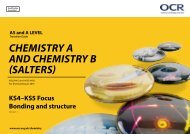CHEMISTRY B (SALTERS)
rbhW308ZeDB
rbhW308ZeDB
Create successful ePaper yourself
Turn your PDF publications into a flip-book with our unique Google optimized e-Paper software.
A LEVEL <strong>CHEMISTRY</strong> B (<strong>SALTERS</strong>)<br />
DEVELOPING CHEMICAL LITERACY SKILLS<br />
The learners in groups must decide:<br />
• what cards should be excluded because the text is not<br />
relevant to the question asked<br />
• what cards should be grouped together because the text<br />
on them is closely related or because on one card there<br />
is a statement and on another card there is evidence to<br />
support that statement<br />
• in what sequence the cards or groups of cards should be<br />
arranged so that there is a clear line of reasoning evident in<br />
the response and the response has a logical structure.<br />
After this initial activity, groups of learners can be presented<br />
with another question but this time without the scaffolding.<br />
Now the group must suggest possible ideas for themselves.<br />
They must decide about the relevance of these ideas, which<br />
ideas are related and how to structure their response so that it<br />
is coherent and has a clear thread of ideas running through it.<br />
They might also consider the type of connecting words that<br />
would be useful to include in their response.<br />
Discussion in groups is an excellent way for learners to develop<br />
their literacy skills. They are able to compare their ideas with<br />
those of other members of the group and later with those from<br />
other groups. These discussions may reveal misconceptions<br />
about technical terms and enable learners to articulate their<br />
ideas and use appropriate words to connect ideas together.<br />
THE PRE-RELEASE ADVANCE<br />
NOTICE ARTICLE<br />
The paper ‘Scientific literacy in chemistry’ (component 02)<br />
includes a pre-release Advance Notice article and questions<br />
within this paper require learners to refer to this article. Learners<br />
are expected to be able to extract and manipulate data,<br />
interpret and use information and to show comprehension by<br />
written communication with regard to logical presentation and<br />
the correct use of appropriate chemical terms.<br />
Helping learners with the pre-release article<br />
Learners should be given opportunities throughout their<br />
course to develop the skills that they will need to answer<br />
questions based on a pre-release article. They can be given<br />
short articles with questions that require them to extract and<br />
manipulate data and interpret and use information. Sources<br />
of suitable articles are described in the next section. Articles<br />
can be adapted from the original by leaving out equations,<br />
calculations or comments and these removed parts can then<br />
form the basis of suitable questions.<br />
An alternative approach is to present groups of learners with<br />
different articles and ask them to construct questions based<br />
upon them. These questions can be given to other groups.<br />
The ensuing discussion between setters and learners who<br />
answer the questions can embed a clear understanding of skills<br />
involved.<br />
In preparation for the exam, the pre-release article is made<br />
available to teachers and learners well before the date of the<br />
assessment. There is no restriction on the support that teachers<br />
can provide for learners in terms of the advice they can give in<br />
helping learners interpret the content.<br />
Learners should be encouraged to read the article carefully, and<br />
to investigate the topics covered in the article for themselves.<br />
This is important as they will not have time to read the article<br />
if they meet it for the first time during the examination. An<br />
effective approach is to ask learners to discuss the article with<br />
other learners as this will enable them to identify aspects<br />
they are unsure about and enable them to clarify their<br />
understanding of technical terms.<br />
THE PRACTICAL INSERT<br />
The paper ‘Practical skills in chemistry’ (component 03) includes<br />
a Practical Insert on which learners must draw in order to<br />
answer one of the questions. This requires them to extract and<br />
manipulate data and to interpret and manipulate information<br />
in the context of a practical activity. The key difference<br />
from the Advance Notice article in paper 2 is that in paper<br />
3 learners must demonstrate these skills in situ, absorbing<br />
and interpreting information in the examination without the<br />
opportunity to discuss things with other learners or their<br />
teacher and without the opportunity to carry out background<br />
research.<br />
It is highly likely that the Practical Insert will include<br />
experimental data. Learners should be prepared to manipulate<br />
this data by drawing appropriate graphs or by carrying out<br />
suitable calculations. They may be asked to comment on<br />
aspects of data in terms, for example, of significant figures,<br />
accuracy, error, precision and uncertainty or to comment<br />
on and to use provided graphs. They may also be asked to<br />
comment on experimental design, to identify limitations in<br />
experimental procedures and to suggest improvements to the<br />
procedures.<br />
The OCR GCE Chemistry Practical Skills Handbook is a valuable<br />
source of information about aspects of practical work that<br />
may be assessed using the Practical Insert. It covers the skills of<br />
planning, analysis and evaluation with appendices that go into<br />
greater detail about measurements, units and graphical skills.<br />
Helping prepare learners for using the Practical Insert<br />
Learners may often be given instructions to follow when<br />
carrying out practical work. It is good practice to ask them<br />
why particular equipment is chosen and why the sequence of<br />
procedures may be important. It is important that learners think<br />
about what they do rather than just treat the instructions as a<br />
recipe to follow.<br />
Sometimes they should be given the task of designing their<br />
own experiments. These tasks may take the form of mini<br />
investigations. They might include planning an experiment to:<br />
• find the concentration of ethanoic acid in vinegar<br />
• find the most cost effective bleach<br />
6 © OCR 2017




